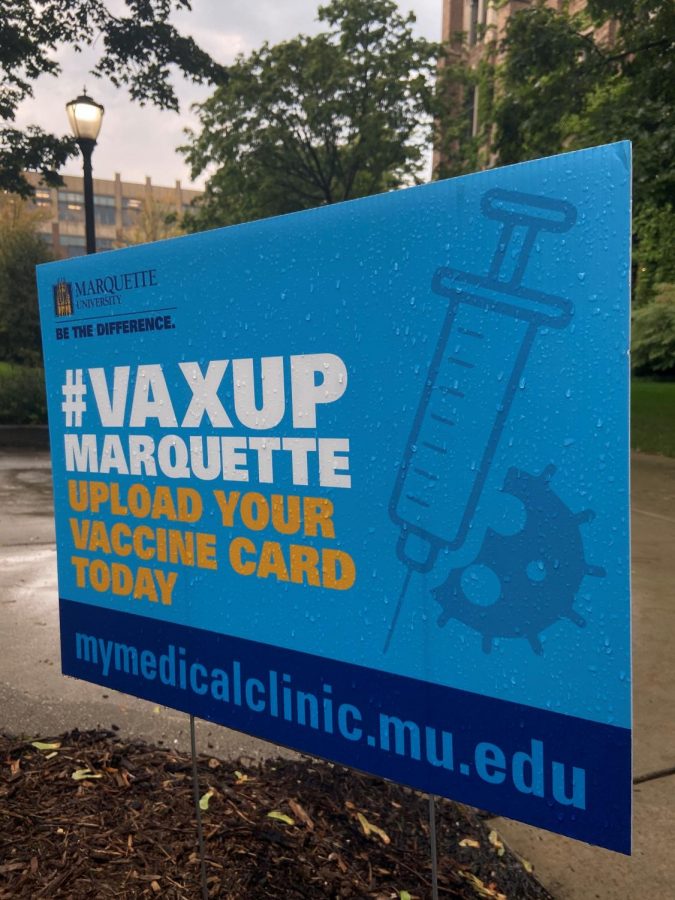The first official Wisconsin case of the Omicron variant was reported Dec. 4 after the first case in the United States was detected in California Dec. 1.
The variant was first identified in Europe, a week before cases were reported Nov. 24 in South Africa.
“I honestly was not surprised. I feel as if we’re in a never-ending cycle of new variants and strains,” Elysa Roldan, a senior in the College of Health Sciences, said. “It gets scary to think of it never ending anytime soon.”
The Omicron variant has been labeled “a variant of concern” by the World Health Organization saying it poses a “very high” global risk of infection and has been confirmed in more than 30 countries.
The Milwaukee Health Department issued a mask advisory for Milwaukee County Nov. 30, which provides notice that all individuals, regardless of vaccination status or past COVID-19 infection, are recommended to wear a mask at all times when indoors in a public setting.
DePaul University announced Dec. 3 they would be returning to online learning for the first two weeks of the winter quarter amid concerns of a potential surge in COVID-19 cases due to the Omicron variant.
“I think Marquette could go back online, but honestly if we keep up our vaccine practices I have hope we won’t,” Maggie Timmerman, a sophomore in the College of Business Administration, said.
Marquette announced Nov. 30 that due to Marquette’s status as a federal contractor, Marquette University employees are required to be fully vaccinated against COVID-19 by Jan. 18, 2022.
As of Dec. 6, 94% of Marquette students and 93% of faculty and staff have submitted proof of COVID-19 vaccination.
Marquette announced Dec. 2 that the indoor mask requirement in public spaces and quarantine and isolation protocols will remain in place for next semester.
“Marquette has been strong in allowing students to still come to class and stay healthy,” Abby Willner, a sophomore in the College of Communication, said. “I think they will give students the option to come and attend in-person or online and that’s a good thing to do.”
WHO said this variant has been detected at faster rates compared to previous surges in infection and more than 30 mutations have been identified in the spike protein, the part of the virus that binds to human cells, making this variant the most heavily-mutated version of the virus so far.
The organization also reported milder symptoms regarding this particular variant. Many say they have experienced fever, cough and shortness of breath, however, those diagnosed with Omicron have not reported a significant loss of taste or smell.
WHO said milder symptoms could help the virus spread because people may not know they have the virus.
The Omicron variant has been detected in 17 U.S. states, as of Monday.
The Biden administration imposed travel bans Nov. 30 on arrivals from eight nations in southern Africa: Botswana, Eswatini, Lesotho, Malawi, Mozambique, Namibia, South Africa and Zimbabwe in response to the new variant.
All international travelers to the United States, including Americans, must take a COVID-19 test no more than one day before travel, regardless of vaccination status, as of Dec. 2.
Federal mask requirements on all public transportation have also been extended until March 18, the third extension since the mandate was first implemented Feb. 1.
There is currently no evidence that the Omicron variant is associated with more transmission or more risk of evading vaccines and the variant is still detectable by current COVID-19 tests. Dr. Anthony Fauci, America’s top infectious diseases expert, called the variant “a bit encouraging regarding the severity.”
“We are continuing to monitor the information regarding the Omicron variant as it becomes available. Much is yet to be learned,” Keli Wollmer, executive director of the Marquette University Medical Clinic, said.
27 COVID-19 variants have been tracked by WHO since the beginning of the COVID-19 pandemic but WHO has only classified five variants of concern.
The Centers for Disease Control and Prevention said the Delta variant continues to be the predominant circulating variant.
“The best way to protect yourself from all COVID-19 variants is to continue to wear a mask indoors, get vaccinated and get a booster dose when eligible. Follow CDC travel guidance if traveling domestically or internationally,” Wollmer said.
COVID-19 booster shots are available for everyone ages 18 and older. The CDC recommends getting a booster at least two months after completing your primary COVID-19 vaccination if you received the single dose of Johnson & Johnson and at least six months if you received both doses of Pfizer or Moderna.
Marquette’s University’s COVID-19 alert level is moderate, as of Dec. 6, with 91 confirmed positive COVID-19 cases in the last 30 days.
This story was written by Bailey Striepling. She can be reached at [email protected].




